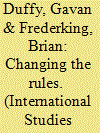| Srl | Item |
| 1 |
ID:
089036


|
|
|
|
|
| Publication |
2009.
|
| Summary/Abstract |
Constructivists often refer to the end of the Cold War to illustrate their contention that social rules are not immutable. Agents can change the rules by performing actions that undermine them. In this article, we describe the Cold War as a set of social rules sustained by superpower speech acts. We show that, by altering their behavior, the superpowers undermined the felicity of these rules. In so doing, they progressively dismantled the rules of the Cold War. Our model captures the competing arguments in the ongoing debate about whether the rationalist buildup argument or the constructivist new thinking argument better explains the end of the Cold War. Within the model, we identify the rules that, when made infelicitous by the superpowers, resolves tensions in the Cold War rule system in ways consistent with each argument. We conclude by showing how these competing arguments are reflected in contemporary debates concerning the nature of the global security rules emerging in the post-cold-war world.
|
|
|
|
|
|
|
|
|
|
|
|
|
|
|
|
| 2 |
ID:
153791


|
|
|
|
|
| Summary/Abstract |
Is the United Nations Security Council (UNSC) a legitimate organization? Do the veto powers legitimately pursue international security, or do they protect their narrow national interests? One way to evaluate the legitimacy of the UNSC is through its agenda. Does it address the most significant conflicts in world politics? Or is it influenced by the national interests of the veto powers? This article addresses these questions with a dataset that includes the number of UNSC meetings held and resolutions passed on 40 conflicts from 1991 to 2013. This analysis provides evidence for the legitimacy of the UNSC—conflicts with more refugees and more deaths are significantly more likely to be on the agenda. The analysis does not support critics of the UNSC—the national interests of the veto powers, measured as arms sales to and trade with the conflict participants, do not significantly alter the UNSC agenda.
|
|
|
|
|
|
|
|
|
|
|
|
|
|
|
|
| 3 |
ID:
083525


|
|
|
|
|
| Publication |
London, Routledge, 2007.
|
| Description |
vii, 197p.
|
| Standard Number |
9780415770750
|
|
|
|
|
|
|
|
|
|
|
|
Copies: C:1/I:0,R:0,Q:0
Circulation
| Accession# | Call# | Current Location | Status | Policy | Location |
| 053944 | 341.2323/FRE 053944 | Main | On Shelf | General | |
|
|
|
|